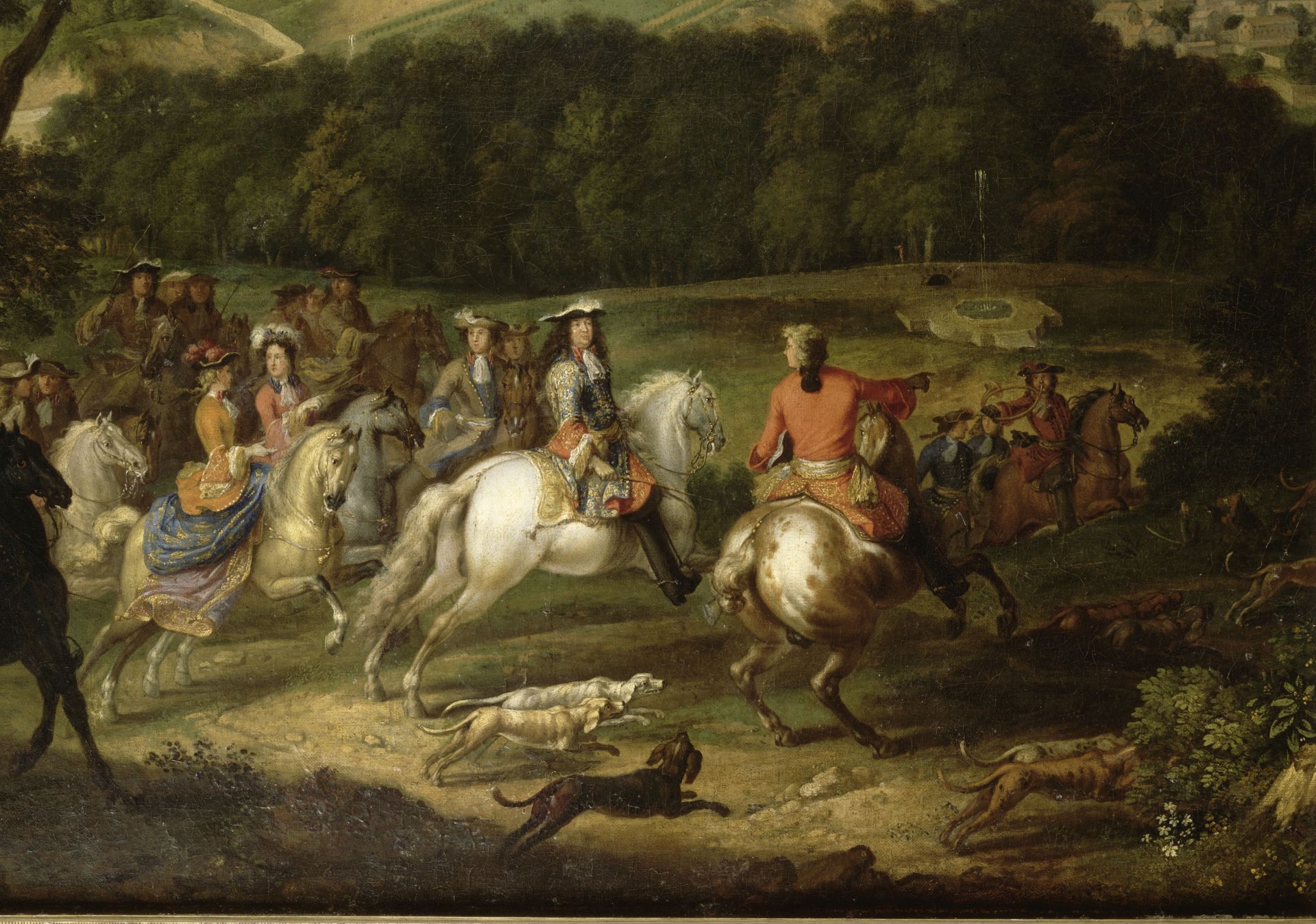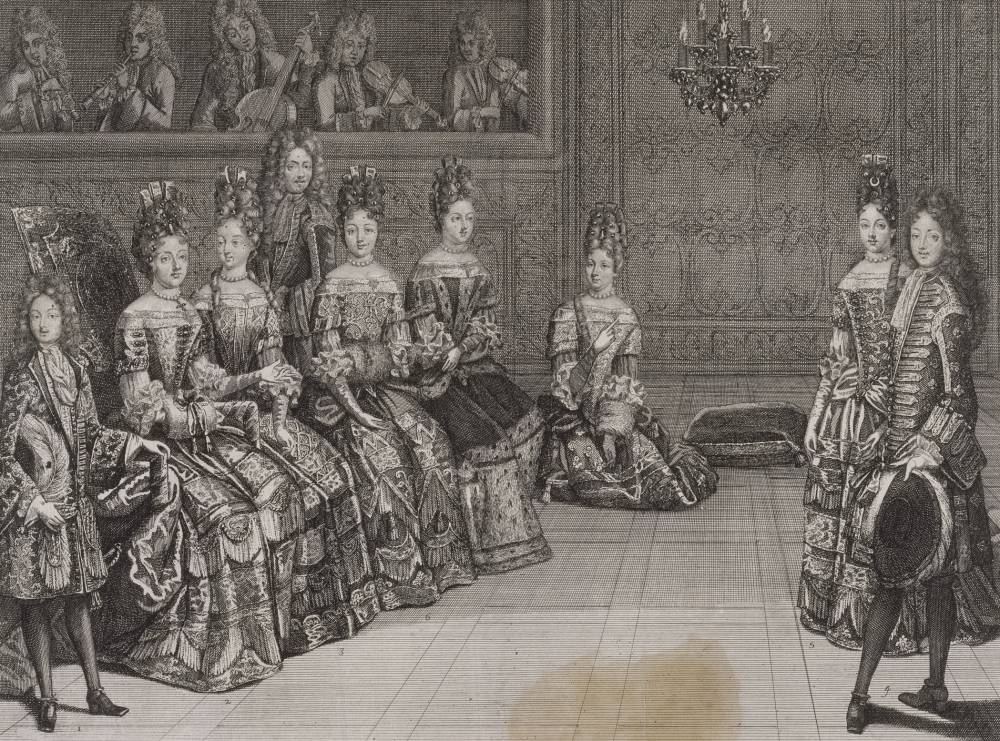A right royal day of music!
Olivier Baumont, harpsichordist, teacher at the National Conservatoire & musicographer takes us through Louis XIV’s day of music.

© Gallimard

Three musical programmes governed life at court:
The Ordinary: permanent events – the King’s Lever, Mass, private luncheons (diners au etit-couvert), hunts (not strictly Ordinary but repeated almost daily), royal apartment soirées, balls & theatre, supper and bedtime. To this can be added Ordinary yearly rituals - religious events such as Christmas, Easter, Pentecost, etc.
The Extraordinary: one-off events such as weddings, births, deaths & funerals, military victories & defeats and visits from ambassadors.
The Particular: personal programmes for the royals, including music lessons.
“With eyes closed and no watch, music connoisseurs could guess the time of day, the music schedule was so precise! It was an ingenious idea on the part of Louis XIV to make music a sort of daily backdrop to the grand spectacle of his reign.”
7 am
The Petit Lever in the presence of close family members (the King’s brother and children) preceded the Grand Lever attended by selected courtiers. The ritual was so strict and detailed that it resembled a court ballet, but without the music!
10 am
Music was performed for the first time in the day during Mass in the Royal Chapel.
Around 11 am
Once Mass was over, the King joined his cabinet to hold a Council of Ministers. There was a set schedule – on Sundays, the Council of State; on Tuesdays, the Council of Finance; on Thursdays the Building Projects, etc. Although music was not supposed to be placed at such times we know that Louis XIV had installed a Louis Denis harpsichord in his cabinet in Versailles in June 1680, which surely means that from time to time he must have interrupted his Ministers to listen to music!
1 pm
During the private luncheon (Dîner au petit couvert), the King ate alone, often in his Bedchamber. A group of courtiers attended – the King dining was entertainment, on a par with a comedy by Molière, and accompanied by the famous 24 violin ensemble. The dishes must have been slightly cold by the time they arrived from the kitchens at the other end of the Palace!
Around 2 pm
Time for the Bourbons’ favourite pastime – hunting, royal entertainment par excellence. Louis XIV opened the door to an entire musical repertoire for French or hunting horns. During the hunt, the King was accompanied by the Music of the Royal Stables. Playing a horn while riding a horse must have been a challenge!
6 or 7 pm
From the autumn of 1682 onwards, soirées were held in the royal apartments three times a week between All Saints Day and Easter, usually on Mondays, Wednesdays and Thursdays. On Saturdays there was a ball, and the other evenings, theatre. When the weather was fine in summer, the soirees took place in the Palace grounds. Every room in the palace wing, from the Salon de l’Abondance to the Salon d’Apollon had a specific purpose (for billiards, buffets, etc.). The largest of these, the Salon de Mars, was equipped with gaming tables. There used to be galleries for the musicians flanking the fireplace. These select soirées were treated to (often small ensembles from) the Music of the King’s Chamber. Marc-Antoine Charpentier composed Les Plaisirs de Versailles specifically for these private soirées. There was always music at theatrical events too. It is hard to imagine, but Racine’s tragedies were often interrupted by performances of chaconne dances.
10 pm
Supper was late. Until 1690 it was held in the antechamber of the Queen’s, and later the King’s apartment. The King dined with his immediate family - Queen Marie-Thérèse (who died a year after moving to Versailles in July 1683), and the royal children and grandchildren. Many courtiers attended, but they merely looked on while the dishes being brought in! Supper was always accompanied by music, usually the violins and oboes of the Music of the Royal Stables, although there are accounts of a supper one November in 1684 at which three lutes and a theorbo were played. The musical ensemble was made to match the occasion. When a Prince visited there were trumpets and timpani. Lalande composed his Symphonies for the King’s supper. The meal only lasted 45 minutes but came in three courses – soup & starters, roast meats (rots) and entremets or dessert - around forty dishes in all. The King reportedly had an enormous appetite.
Midnight
Versailles started to get sleepy as the King’s day drew to a close. The public Grand Coucher ritual came before the more private Petit Coucher. Arrangements by Lully, composed for when the King retired, have survived from his early reign. The music was sometimes played later in Versailles when the King went to bed. When he felt tired or unwell he sometimes summoned his guitarist or a trio of musicians. Generally speaking, music was played at Versailles ‘when the King requested it’. The musicians of the King’s Chamber had to remain at the ready to delight the King with their music.

Quatrième Chambre des appartements
André Trouvain (Bibliothèque municipale de Versailles)
A musical soirée in a royal apartment at Versailles Palace
La musique à Versailles, Olivier Baumont. Ed. Actes Sud & Centre de musique baroque de Versailles (2007)